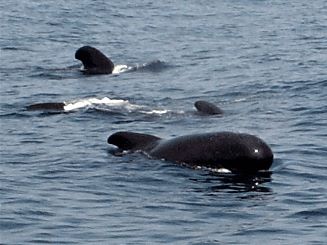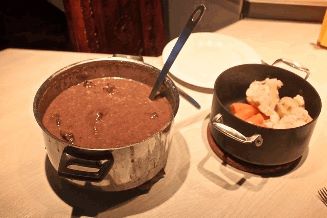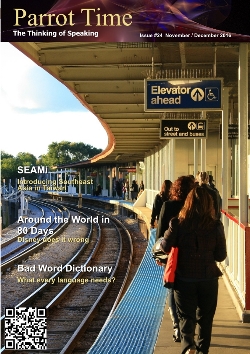The Grind: Why the Faroese Hunt Whales

|
The Faroe Islands are famous worldwide not only for their beauty and culture, but also for the grindadráp, or whale slaughter. In an average year, the Faroese kill approximately 800 pilot whales in order to eat their meat and blubber, which is the Faroese national dish. This practice has provoked considerable controversy among anti-whaling organizations. In this article, we will look at the discussion from the perspective of two Faroe Islanders. Some of the most common arguments against Faroese whaling are claims that the pilot whales are endangered, that it is a tradition that has no place in the modern world, that whales are an intelligent species that should not be eaten, and that whale meat is contaminated and unfit for human consumption. Faroese journalist Elin Brimheim Heinesen responds to these arguments in excepts taken from her blog (http://heinesen.info/wp/): The Faroese should stop killing pilot whales because the pilot whales are endangered. The pilot whale is one of the most common whale species in the oceans all over the world, especially the long finned pilot whale. Pilot whales are not endangered according to the authorities in this matter. The NAMMCO (North Atlantic Marine Mammal Commission) is the real authority on all matters regarding the North Atlantic pilot whale. The NAMMCO base their estimation on sightings – and they estimate that the number of long finned pilot whales in the North- and East Atlantic is 780.000, and that’s excluding the West Atlantic, so the number might be, even significantly higher. The ACS (American Cetacean Society) agrees with those numbers and the IUCN also agrees that the pilot whale hunt is, as they say: ‘probably sustainable’. The IWC doesn’t consider itself an authority on small cetaceans, of which the long finned pilot whale is one. So the pilot whale is not on the list of endangered animal species. The Sea Shepherd organisation stands alone in its claims that the long finned pilot whale is endangered.  Pilot whales swimming in the ocean The Faroese have killed pilot whales for at least 1.200 years, so the pilot whales should probably have been extinct by now, if the pilot whaling in the Faroes was a threat to the population as a whole. Since 1584 (that is how long it’s been carefully monitored) the Faroese have killed 850 pilot whales (in later years around 800) on average a year, so that’s a tenth of a percent (0.1%) of the pilot whale population only in the North Atlantic, which is very far from exceeding the pilot whales’ reproduction rate at around 2 %. There is nothing to indicate that the pilot whale population is in decline. As long as the pilot whale is not endangered, this is not a rational argument. So this is a failed argument. The Faroese should stop killing pilot whales because such a tradition doesn’t belong to the 21st century. They shouldn’t do this just because it is a tradition. People in the Faroe Islands don’t kill pilot whales because it is a tradition. They do it for food, as they’ve always done. But opponents call this practice of getting food ‘a tradition’, because this way of living off of the natural resources of the ocean has been common on these islands for more than 1,200 years. Pilot whale meat and blubber is so common and natural for the Faroese to eat that to them this food is no different than beef or bacon is to people in other countries, where they have a tradition for eating cattle or pig meat. It’s just that you can’t breed pilot whales in the same manner as you can breed cattle or pigs. But why would you want to do that, if there is an abundance of pilot whales around the islands living free their whole life? Why would the Faroese deprive the whales of that privilege and somehow cage them or put them in ocean feed lots? Who’s to decide what belongs to the 21st century or not? Or which traditions are worth keeping for the Faroese or not? It is definitely not for people outside the Faroe Islands to decide. The right word for this is ethnocentrism. That is: judging another culture solely by the values and standards of one’s own culture. The ethnocentric individual will judge other groups relative to his or her own particular ethnic group or culture, especially with concern to language, behavior, customs, and religion. Ethnocentrism is not rational, so again a failed argument. The Faroese should stop killing pilot whales because the whales are intelligent, sentient, and sociable. Sea Shepherd founder Capt. Watson claims that it is a sign of highly developed intelligence that the whales have figured out how to live in harmony with nature, unlike us humans, so therefore they are more intelligent than people. Okay, if that is his logic, he could just as well claim a squirrel is more intelligent than humans. A squirrel also lives in harmony with nature, and nobody would say that a squirrel is more intelligent than a human being for that reason. Capt. Watson is just being manipulative. There is no doubt that bottle-nosed dolphins are some of the most intelligent creatures in the animal kingdom. Dolphins are good at learning tricks, especially in captivity – also pilot whales to a degree. Dolphins are proven more intelligent than most other animals, but they are still very far from being as intelligent as people. And not all whales rank that high. The pilot whale is in the dolphin family, but pilot whales are not the most intelligent of the dolphins. Pilot whales are not especially intelligent in comparison to many other mammals either. Other animal species that humans kill for food are also proven highly ‘intelligent’. So this argument is inconsistent, if those who claim it is wrong to kill pilot whales because of their intelligence do not also oppose the killing of other intelligent animals for food. Whether humans should refrain from killing “intelligent” animals or not is a matter of opinion. And there is no rational reason for claiming that one opinion is morally more right than the other. Also: How intelligent should an animal be to obtain a rank between the untouchables? How would you measure that to be able to set a border between highly intelligent and “stupid” animals? Yes, pilot whales are sentient and sociable, that is true. And so are all other animals too, more or less. Animals, most people in the world eat – like cows and pigs, even chickens – are also sentient and sociable. So you can’t on the one hand say that the Faroese shouldn’t kill whales on these grounds, and at the same time accept the killing of other sentient and sociable animals. If you are against the killing of animals because they are sentient and sociable, you are inconsistent if you don’t include all animals in the equation – that is: you must also oppose the killing of cattle, pigs and chickens, yes, any animal in fact. That is unrealistic. The Faroese should stop killing pilot whales because pilot whale meat and blubber are contaminated and it is dangerous for the Faroese people’s health to eat it. The Faroese will likely stop the pilot whaling gradually over the coming years, because pilot whale meat and blubber does contain mercury/methyl mercury at levels considered too high. Pilot whales also contain other toxins coming from man-made pollution, like PCB and DTD. And there are indications that exposure to some of these contaminants may affect human fetuses and their development. This fact is absolutely relevant and the majority of the Faroese people recognize this. But the anti-whaling activists often exaggerate the effects of this contamination, which are more subtle than they let people believe. There has, for instance, not been one single reported fatality due to eating pilot whale meat and blubber, not ever.  What's for dinner? Whale steak and vegetables. The Faroese health authorities recommend that pregnant women, or women who plan on being pregnant soon, should not eat pilot whale foods at all, as the critical levels for methyl mercury intoxication of pregnant women and fetuses are lower by a factor of 2–5 than for the general population. They do not recommend that pilot whale meat and blubber should be served to younger children, while it seems to be within safe limits for the rest of the population to eat pilot whale meat and blubber once to twice a month. The Faroese people are not indifferent to this unfortunate development. People are taking action personally – many do not serve pilot whale meat and blubber to their children any longer, and most younger women as well as child-bearing women choose not to eat pilot whale meat and blubber at all. But as long as the health authorities haven’t recommended that the Faroese population as a whole completely refrain from eating pilot whale meat and blubber (which, by the way, is the Faroese national dish), and, as long as pilot whaling is done in a responsible, sustainable, care-taking manner, the Faroese see no reason for stopping pilot whaling altogether. And they think that there is absolutely no valid reason for others to interfere in Faroese matters, trying to force the Faroese not to utilize this natural resource in their own country. • |
| The Grind: Why the Faroese Hunt Whales | |||||||
| Writer: | Elin Brimheim Heinesen, Morten Ejner Hønge, Miranda Metheny | ||||||
| Images: | |||||||
| |||||||
| Sources: | |||||||
| |||||||
| Miranda was the editor for these articles and wrote the introductory paragraphs | |||||||
Miranda Metheny retains all copyright control over her images. They are used in Parrot Time with her expressed permission.
All images are Copyright - CC BY-SA (Creative Commons Share Alike) by their respective owners, except for Petey, which is Public Domain (PD) or unless otherwise noted.
comments powered by Disqus



















